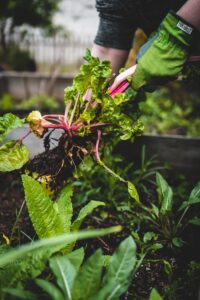Picture this: a thriving vegetable garden bursting with vibrant greens, plump tomatoes, and colorful peppers. Now imagine achieving this bountiful garden with minimal effort and maximum benefits. One simple yet effective technique is to use mulch. Mulch, a layer of organic material spread over the soil surface, offers many advantages for your vegetable garden. From conserving moisture to suppressing weeds and improving soil fertility, mulch is the ultimate secret weapon for any green thumb looking to elevate their gardening game. Let us take you on a journey through the benefits of using mulch in your vegetable garden, and soon, you’ll be reaping the rewards of a more productive and sustainable garden.
Improved Soil Quality
Using mulch in your vegetable garden can significantly improve soil quality. One of the critical benefits of mulching is that it increases soil fertility. As the mulch breaks down over time, it adds organic matter to the soil, providing essential plant nutrients. This helps to nourish them and promote healthy growth.
Another way in which mulch improves soil quality is by enhancing soil structure. The layer of mulch acts as a protective barrier, preventing the soil from becoming compacted or crusted. This allows for better aeration and drainage, creating an optimal environment for root development. With improved soil structure, your plants are better able to access water and nutrients, leading to more robust and more productive crops.
Mulching also plays a crucial role in retaining soil moisture. By acting as a natural insulator, mulch helps slow down water evaporation from the soil. This is especially important during hot and dry periods, as it helps to preserve the moisture levels necessary for plant growth. Additionally, mulch helps prevent soil erosion, as it acts as a barrier against heavy rain or wind that can wash away valuable topsoil.
Weed Suppression
One of the most significant advantages of using mulch in your vegetable garden is the effective reduction of weed growth. Mulch forms a protective layer over the soil, preventing weed seeds from receiving the sunlight they need to germinate. This significantly minimizes the time and effort spent on manual weeding, allowing you to focus more on enjoying your garden.
Not only does mulch suppress weed growth, but it also helps to minimize competition for nutrients and water. Weeds are notorious for stealing these vital resources from your vegetable plants, potentially hindering their growth and yield. However, keeping the soil covered with mulch creates a barrier that makes it harder for weeds to establish themselves and rob your vegetable plants of the nourishment they need.
Temperature Regulation
Mulching also assists in maintaining soil temperature, which is crucial for the health of your vegetable plants. In hot weather, the layer of mulch acts as a cooling agent, protecting the roots from extreme temperatures and preventing heat stress. This is especially important for sensitive plants suffering from wilt or even dying in scorching conditions.
During colder periods, mulch acts as an insulator by providing an extra layer of protection. This insulation helps to prevent the ground from freezing too deeply, which can be detrimental to the roots of your vegetable plants. By maintaining a more stable soil temperature, mulch helps to extend the growing season and ensures the survival of your crops.
Water Conservation
Many gardeners are concerned about water conservation, and mulching can be a powerful tool in addressing this issue. By covering the soil with mulch, you significantly reduce water evaporation. The mulch layer acts as a shield, preventing direct sun exposure and slowing down the loss of moisture from the soil surface. This means you can water your vegetable garden less frequently and maintain adequate soil moisture levels.
In addition to reducing water evaporation, mulch also preserves soil moisture. The mulch layer helps lock moisture into the soil, preventing it from being rapidly absorbed by the surrounding environment. This is especially beneficial in areas with sandy or loamy soils that tend to drain quickly. By retaining moisture, mulch ensures that your vegetable plants have a consistent water supply, promoting healthy growth and preventing drought stress.
By conserving water, mulching also minimizes water usage. This is particularly important in regions with limited water resources or during drought conditions when every drop counts. Using mulch in your vegetable garden not only helps you become a more responsible gardener but also saves you money by reducing your water bill.
Erosion Control
Controlling soil erosion is crucial for maintaining the health and productivity of your vegetable garden. Mulching is significant in preventing soil erosion and stabilizing the soil, especially on slopes or areas prone to runoff. When heavy rain falls, or strong winds blow, the layer of mulch acts as a protective barrier, minimizing the impact of these erosive forces.
The mulch layer absorbs raindrops’ impact, preventing them from directly hitting the soil surface and causing it to erode. Instead, the water is absorbed and filtered through the mulch, allowing it to be slowly released into the soil. This helps prevent the loss of valuable topsoil and keeps your vegetable plants anchored.
Mulch is particularly beneficial in sloping areas, as it helps anchor the soil and reduce runoff. Without mulch, rainwater can quickly wash down the slope, taking valuable soil with it and leaving your plants vulnerable. By stabilizing the soil, mulch provides a protective layer that helps to minimize erosion and maintain the integrity of your garden beds.
Nutrient Retention
Proper nutrient retention is essential for the health and productivity of your vegetable garden, and mulch can significantly contribute to this aspect. Mulching helps to prevent nutrient leaching, which is the process by which essential nutrients are washed out of the soil by water. The layer of mulch acts as a buffer, slowing down water movement and allowing plants more time to absorb the nutrients they need.
Additionally, mulch supplies organic matter to the soil as it breaks down. This nutrient-rich organic matter acts as a slow-release fertilizer, nourishing your vegetable plants. By replenishing the soil with these valuable nutrients, mulch helps to maintain the fertility of your garden beds, ensuring optimal growth and abundant harvests.
Pest and Disease Control
Pests and diseases can pose a significant threat to the health and vitality of vegetable plants in any garden. Mulching can help act as a natural barrier against pesky pests that may invade your garden. The layer of mulch creates an obstacle that can deter crawling insects, such as slugs or beetles, from reaching your plants. This can reduce the need for chemical pesticides and promote a more environmentally friendly approach to pest control.
Furthermore, mulching has been found to suppress certain plant diseases. Some diseases, such as fungal infections, thrive in moist conditions. Covering the soil with mulch creates a drier environment that is less favorable to the development and spread of these diseases. This can help to protect your vegetable plants and minimize the risk of crop loss due to disease.
Organic Weed Control
Many gardeners now opt for more natural and organic weed control methods, and mulching fits perfectly into this approach. Using natural materials such as straw, wood chips, or compost as mulch helps to reduce the need for chemical herbicides. This is better for the environment and safer for your vegetables and you as the gardener.
Organic mulch effectively suppresses weed growth by smothering existing weeds and preventing new ones from germinating. It forms a physical barrier that inhibits weed seedlings from receiving the sunlight they need to grow. Mulching allows you to develop a healthier and more eco-friendly vegetable garden by eliminating the need for chemical herbicides.
Aesthetically Pleasing
Aside from the functional benefits, mulch can also greatly enhance the appearance of your vegetable garden. The layer of mulch creates a clean and tidy look, giving your garden a more organized and well-kept appearance. The uniformity of mulch also helps to visually delineate garden beds and pathways, creating a sense of order and structure.
Furthermore, mulch comes in various colors, textures, and materials, allowing you to customize the look of your garden to your personal preferences. Whether you prefer a rustic charm with natural wood chips or a vibrant pop of color with decorative bark mulch, there is a mulch option that can enhance the overall aesthetic appeal of your vegetable garden.
Time and Labor Savings
One of the most significant advantages of using mulch in your vegetable garden is its time and labor savings. The layer of mulch significantly reduces the need for frequent weeding by suppressing weed growth. With fewer weeds, you’ll spend less time bent over, pulling them out of your garden beds. This means more time to enjoy the fruits of your labor and engage in other gardening activities you love.
Additionally, mulching decreases watering frequency. The mulch layer helps conserve soil moisture by reducing water evaporation, meaning you won’t have to water your plants as often. This saves you time, effort, and water resources, allowing you to manage your vegetable garden efficiently.
In conclusion, using mulch in your vegetable garden offers many benefits. From improving soil quality to suppressing weeds, regulating temperature, conserving water, controlling erosion, retaining nutrients, and even helping with pest and disease control, mulch is an invaluable tool for any gardener. Furthermore, mulching enhances the aesthetics of your garden, saves you time and labor, and promotes a more sustainable and eco-friendly approach to gardening. So, why not try mulching and reap the rewards of a healthier, more productive, visually appealing vegetable garden?



